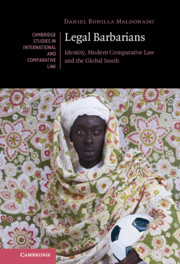Book contents
- Legal Barbarians
- Cambridge Studies in International and Comparative Law
- Legal Barbarians
- Copyright page
- Dedication
- Contents
- Acknowledgments
- The Legal Barbarians
- 1 The Legal Identity of the Global South
- 2 Comparative Instrumental Studies
- 3 Comparative Legislative Studies
- 4 Comparative Law as an Autonomous Discipline
- 5 The Critical Academic of Law
- Index
- Cambridge Studies in International and Comparative Law
4 - Comparative Law as an Autonomous Discipline
Legal Taxonomies and Families
Published online by Cambridge University Press: 20 August 2021
- Legal Barbarians
- Cambridge Studies in International and Comparative Law
- Legal Barbarians
- Copyright page
- Dedication
- Contents
- Acknowledgments
- The Legal Barbarians
- 1 The Legal Identity of the Global South
- 2 Comparative Instrumental Studies
- 3 Comparative Legislative Studies
- 4 Comparative Law as an Autonomous Discipline
- 5 The Critical Academic of Law
- Index
- Cambridge Studies in International and Comparative Law
Summary
In the fourth chapter of the book I examine the third and last moment of the genealogy of modern comparative law: comparative law as an autonomous discipline. The mythical moment in which the discipline emerges is the First International Comparative Law Conference organized in Paris in 1900. This conference established the discipline's general objectives - on one hand, the unification and harmonization of legal systems. This purpose, animated by the cosmopolitan spirit of its promoters, emphasized the similarities that the legal orders of the world have and evaluated the idea of unity of law positively. On the other hand, the creation of taxonomies that allow for ordering, describing, and understanding the complexities of the legal world. The paradigmatic product generated by the realization of this objective was the concept of legal families. This idea constitutes one of the axes of twentieth-century comparative law and remains relevant in the happenings of the twenty-first century.The concept of legal families is articulated and developed paradigmatically in the work of René David, in France, and K. Zweigert and H. Kötz, in Germany. In this chapter, I examine the types of subject, geographies, and ideas of legal history created by the legal families narrative constructed by these paradigmatic authors.
Keywords
- Type
- Chapter
- Information
- Legal BarbariansIdentity, Modern Comparative Law and the Global South, pp. 100 - 132Publisher: Cambridge University PressPrint publication year: 2021

